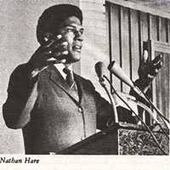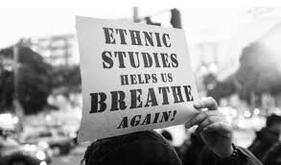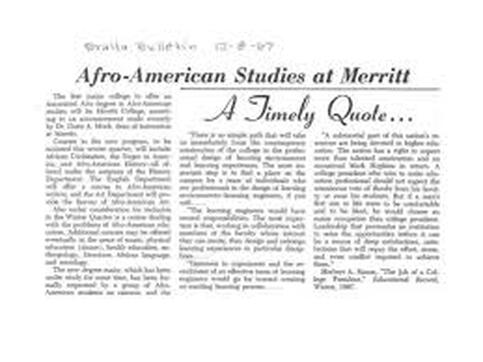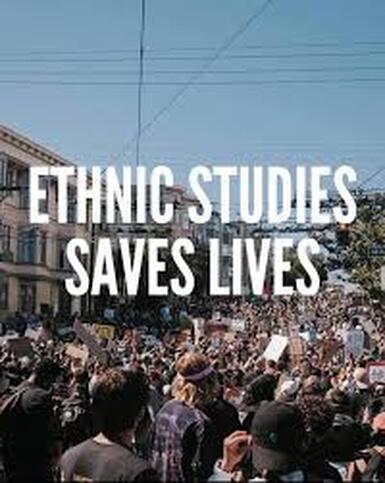What is Ethnic Studies?Ethnic Studies is an interdisciplinary and comparative study of race and ethnicity in the United States, with a special emphasis on four historically defined racialized core groups; Native Americans, African Americans, Asian Americans and Pacific Islanders, and Latina and Latino Americans. Ethnic Studies is offered through various disciplines including Ethnic Studies, Chicana and Chicano Studies, Latina and Latino Studies, African American Studies, Africana Studies, Black Studies, Indigenous Studies, Asian American and Pacific Islander Studies, Filipino Studies, La Raza Studies, and Central American Studies. These disciplines have distinct epistemologies, theories, and methods that center a critical Ethnic Studies lens. Since its inception in the late 1960s, the Ethnic Studies curriculum rejected the historical typecasting of People of Color as nameless, faceless, side-players, or victims of imperialism, colonialism, slavery, and white supremacy. Rather, Ethnic Studies frames People of Color as agents and instigators of change and producers of knowledge, with rich intellectual traditions rooted in cultural practices. From their origins to the present, Ethnic Studies disciplines play a critical role of challenging Eurocentrism within higher education, as well as ensuring that diverse histories, experiences, and theoretical frameworks are valued, debated, and expanded upon in all sectors of society.
See the following letter below - What Ethnic Studies is and is not!
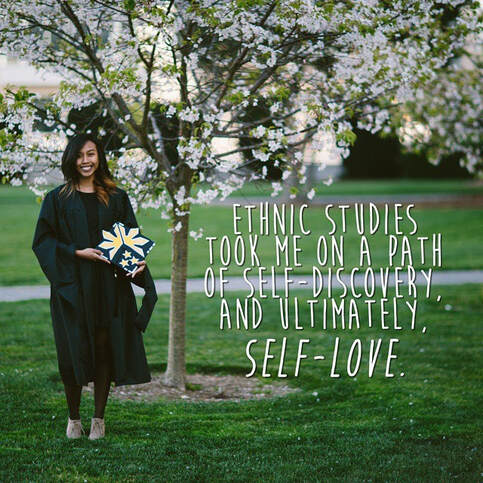
Why Ethnic Studies: The Need for Culturally Congruent Education in American Higher EducationSince its inception in the late 1960s, Ethnic Studies curriculum has rejected the historical typecasting of People of Color as nameless, faceless, side-players, or victims of imperialism, colonialism, slavery, and white supremacy. Rather, Ethnic Studies frames People of Color as agents and instigators of change and producers of knowledge, with rich intellectual traditions rooted in cultural practices. From their origins to the present, Ethnic Studies disciplines play a critical role of challenging Eurocentrism within higher education, as well as ensuring that diverse histories, experiences, and theoretical frameworks are valued, debated, and expanded upon in all sectors of society.
Historical Origins of Ethnic Studies at Community CollegesBefore the student strike for Ethnic Studies at San Francisco State University (SFSU) in1968. Black Student activism at Merritt College resulted in California Community College's first established Black history classes in 1964 and the nation's first degree granting Black Studies Department in 1967 with transferable courses anywhere in American higher education. Thus, it was the community college system that established the first Black Studies Department (Ethnic Studies) in the nation, one full year before the student strike at San Francisco State University. Continued student activism by People of Color would lead to the hiring of Sid Walton as the first Black tenure track faculty at Merritt College in 1965. By June of 1968, Dr. Norvell Smith would become the first Black president of higher education in California. This effort created the foundation and pathway for subsequent courses and departments to emerge in Chicano Studies and later in Ethnic Studies.
|
Historical Origins of Ethnic Studies at San Francisco State UniversityThe demand for Ethnic Studies on college campuses was student-driven and is traced back to the year 1968. For approximately four months, from November 1968 to March 1969, a coalition of Black, Brown, Native American, and Asian American students at San Francisco State College went on strike, locked in a fierce struggle with administrators and faculty on campus. The struggle was led by Black students who began calling for a comprehensive and culturally responsive Black Studies department in 1966. After two years, it was clear that the administration was not willing to go “beyond a paper department without funds or faculty.”(3) Black students were fed up with hollow actions and on November 4, 1968, the Black Student Union announced that “Black people, including students, staff workers, teachers, and administrators” were going on strike.(4) The Black Student Union had ten demands, which included the transfer of all Black Studies courses into a new Black Studies department and “twenty full-time positions” in Black Studies.(5) The strike officially began on November 6, 1968. Within two days, it was endorsed by a coalition of Black, Brown, Native American and Asian American students who had organized the Third World Liberation Front in the Spring of 1967. The Third World Liberation Front added five demands to the Black Student Union’s original ten, “including a call for a School of Ethnic Studies, which would encompass the study of other racially oppressed groups.”(6)
Student members of the Black Student Union, and the Third World Liberation Front argued that the college curriculum lacked relevance to their experience and their histories as People of Color in the United States. Students boldly argued against institutionalized racism and systemic inequalities; they condemned a curriculum that promoted the “white savior” narrative, where “Third World peoples have been portrayed as faceless, dumb, creatures upon which some external factor had done something to them, rather than actors and doers in and of themselves who have played vital roles in shaping the course of American history.”(7) Students at San Francisco State College rallied for increased funding and institutional support for Ethnic Studies, for increased enrollment of students of color on campus, an education that reflected their history and experiences as people of color, and for an education that allowed them to serve the communities they came from. The strike ended on March 20, 1969 when the administration agreed to move all Black Studies courses into a new Black Studies Department and establish an unprecedented and pioneering School of Ethnic Studies. “The school was later renamed the College of Ethnic Studies and included programs in Chicano Studies, Asian American Studies and Native American Studies.”(8) __________________________________________________________________ 3 Martha Biondi, The Black Revolution on Campus (Berkeley: University of California Press, 2012), 56. 4 Ramona Tascoe, telephone interview by Martha Biondi, December 3, 2009. Quoted in Martha Biondi, The Black Revolution on Campus, 56. 5 Biondi, The Black Revolution on Campus, Ibid. 6 Biondi, The Black Revolution on Campus, 59. 7 Mike Murase, “Ethnic Studies and Higher Education for ASian Americans,” Counterpoint: Perspectives on Asian America (Los Angeles: University of California, 1976), 206. | ||||||
